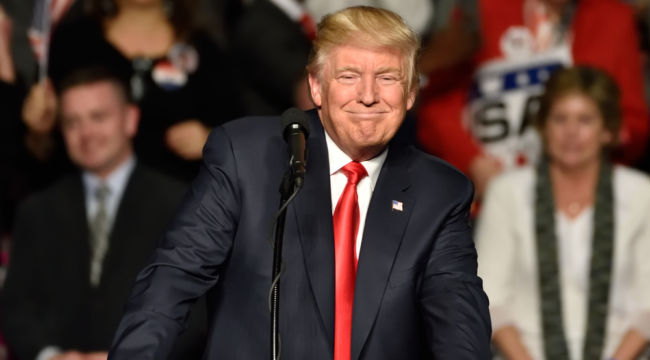Will Trump Nominate Gold Standard Advocate to Fed?
Trump has already exerted more influence over one institution than any other president in over 100 years — the Federal Reserve.
That’s because Trump has had more control over Fed personnel than any president since the Fed was founded in 1913. As I’ve written before, Trump now “owns” the Fed.
When Trump was sworn in, he inherited two vacant seats on the seven-person board of governors of the Federal Reserve System. Holders of those two seats are also members of the Federal Open Market Committee (FOMC), the group that sets U.S. interest rates and monetary policies.
President Obama also had the same vacancies, but he did not nominate anyone to fill the seats because he doubted his chances of getting the nominees past the Republican-controlled Senate and he was sure “President Hillary” would do the right thing and appoint pro-Democratic nominees.
In the end, Trump beat Clinton and the vacancies fell to Trump. Then Trump got another windfall. Within 14 months of becoming president, three additional Fed governors resigned (Dan Tarullo, Stan Fischer and Janet Yellen), and Trump suddenly had five vacancies to fill, or 70% of the entire Fed board.
Trump promoted Jay Powell to chair and appointed Richard Clarida as vice chair, Randy Quarles as vice chair for regulation and Michelle Bowman to fill a seat reserved for community bankers.
All of those appointments were well regarded by Wall Street and the media. But that still left Trump with the two original vacancies.
Trump indicated he wanted to appoint Herman Cain and Steve Moore to fill those seats. Cain is a former presidential candidate, chair of the board of the Federal Reserve Bank of Kansas City and CEO of the Godfather’s Pizza chain. Moore is a think tank analyst, founder of the Club for Growth and a former member of the editorial board of TheWall Street Journal.
Cain has now withdrawn his nomination after running into opposition from Senate Republicans based in part on old allegations of sexual misconduct. Moore is also being opposed by those who fault him for not having a Ph.D. in economics.
Whatever the merits, the real reason they have been opposed by monetary elites is that they are “friends of Trump” and will hold Jay Powell’s feet to the fire to cut interest rates and keep the economic expansion going ahead of the 2020 election.
But if Moore withdraws next or if his nomination is defeated, no worries. There’s some indication that Trump’s next nominee will be Judy Shelton.
She does have a Ph.D. and is a well-known advocate of a new gold standard. Just this Sunday she wrote an article in The Wall Street Journal, “The Case for Monetary Regime Change,” that challenged the current system and defended the classical gold standard.
She has also defended Trump’s trade policies, arguing that those who embrace unfettered free trade dogma “disregard the fact that the ‘rules’ are not working for many American workers and companies.”
For those who want Moore to step aside next, the best advice may be “Be careful what you wish for.”
Regardless, the 2020 presidential election is already beginning to take shape.
A few weeks ago, I unveiled my first forecast on the outcome of the 2020 presidential race. My estimate was that Trump had a 60% chance of winning.
I was also careful to explain that my forecasting model includes constant updating and would no doubt change between now and Election Day on Nov. 3, 2020.
That’s normal. Politics is a highly volatile process and it’s foolish to put a stake in the ground this early. My model has quite a few factors, but the leading factor right now is that Trump’s chances are the inverse of the probability of a recession before the third quarter of 2020.
If recession odds by 2020 are 40%, then Trump’s chances are the inverse of that, or 60%. With the passage of time, Trump’s odds go up because the odds of a recession go down.
If a recession does hit, then Trump’s odds go way down. This dynamic can be used to explain and forecast Trump’s economic policies, including calls for interest rate cuts and efforts to place close friends on the Fed Board of Governors.
It’s all connected.
As usual, I found myself out on a limb with my forecast; the mainstream media are sure Trump will lose in 2020, if he’s not impeached sooner. So it was nice to get some company who sees things my way…
A new Goldman Sachs research report also projects that Trump will win in 2020. Goldman shows a narrower margin of victory than my model, but a win is a win.
Of course, their forecast will be updated (like mine) but we’re starting to see more signs from other professional analysts that Trump is a likely winner after all.
Regards,
Jim Rickards
for The Daily Reckoning



Comments: